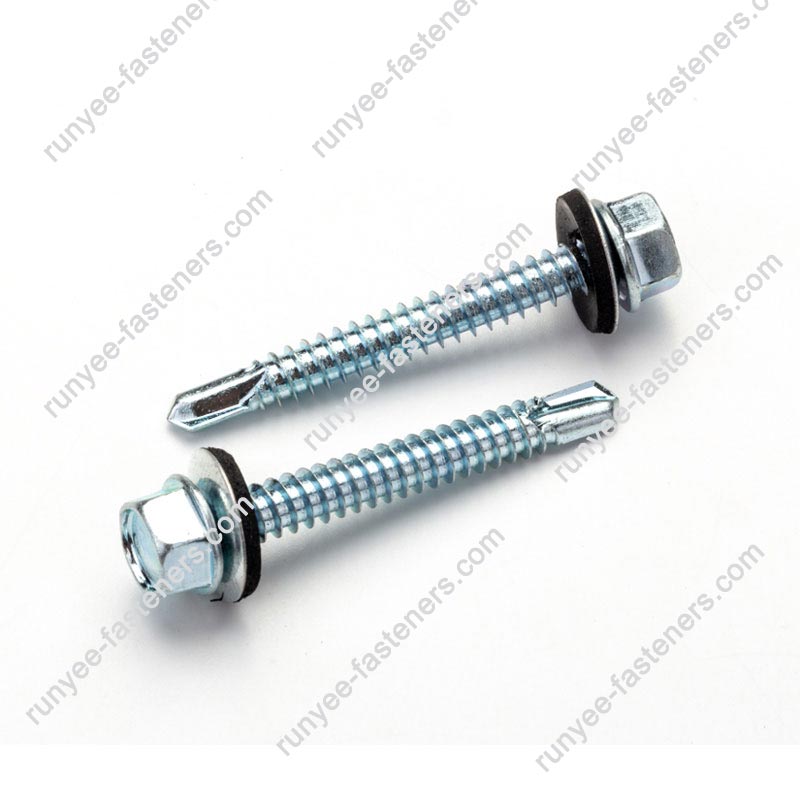How Do Self Drilling Screws Improve Construction Efficiency?
2025-09-24
In modern construction, efficiency and reliability are critical. Self drilling screws have emerged as a revolutionary solution, combining drilling and fastening functions into a single operation.
Self drilling screws are specialized fasteners designed to drill their own hole and secure materials without pre-drilling. This dual-function reduces labor time, minimizes tool usage, and ensures a tight, reliable connection between metal, wood, or composite materials. Their design eliminates the need for pilot holes, streamlining construction processes and lowering overall project costs.
The self-drilling screw consists of three main components: the drill point, the screw body, and the thread. The drill point is precision-engineered to penetrate the material efficiently, while the screw body provides structural stability. Threads are carefully designed to ensure maximum grip and holding power. Various types of threads and points are available to suit different materials, from soft metals to dense steel plates.
By integrating drilling and fastening into one operation, self drilling screws drastically reduce assembly time. This efficiency is particularly valuable in large-scale projects such as steel framing, HVAC installations, roofing, and metal fabrication. Unlike traditional screws or bolts, these screws eliminate multiple steps, reducing potential errors and material waste.
What Are the Key Parameters of High-Quality Self Drilling Screws?
Understanding the technical specifications of self drilling screws is essential for selecting the right product for your application. High-quality screws must meet performance standards in terms of material, coating, thread design, and drill point geometry. Below is a detailed breakdown of critical parameters:
| Parameter | Description |
|---|---|
| Material | Typically high-speed steel (HSS) or carbon steel, sometimes with alloy treatment for extra hardness. |
| Surface Coating | Zinc plating, galvanized, or epoxy coating to prevent rust and corrosion in outdoor or humid environments. |
| Drill Point Type | Standard points, step points, or heavy-duty points designed for different material thicknesses and hardness. |
| Thread Type | Fine or coarse threads depending on the substrate; fine threads for metal, coarse threads for softer materials. |
| Screw Head Style | Pan, hex washer, flat, or bugle head styles to match driver tools and application needs. |
| Diameter Range | Typically from 3.5mm to 12mm, suitable for light to heavy-duty applications. |
| Length Options | Range from 10mm to 150mm to accommodate various material thicknesses. |
| Tensile Strength | High-grade screws can withstand forces up to 1000 MPa, depending on material and design. |
| Compliance Standards | ISO, DIN, or ANSI standards to ensure compatibility and reliability in professional construction. |
These specifications are not arbitrary. Engineers and construction professionals carefully select self drilling screws based on load requirements, environmental exposure, and compatibility with tools. Choosing the correct drill point, thread type, and coating significantly influences the longevity and performance of the installation.
Why Should You Choose Self Drilling Screws Over Traditional Fasteners?
Traditional screws or bolts require pre-drilling, tapping, and often multiple tools. This process is labor-intensive, time-consuming, and prone to errors. Self drilling screws combine these steps, offering numerous advantages:
-
Time Efficiency: Reduces assembly steps by 30-50% in many applications.
-
Labor Cost Reduction: Fewer tools and fewer steps mean lower labor costs.
-
Material Protection: Drill points designed for specific materials reduce the risk of cracking or splitting.
-
Enhanced Holding Strength: Optimized threads and drill geometry create secure fastening with high load-bearing capacity.
-
Versatility: Can be used on steel, aluminum, and other composite materials, making them suitable for a wide range of projects.
Modern construction projects prioritize speed, precision, and durability. Self drilling screws deliver on all three fronts. Their engineered design ensures consistent performance, reduces errors, and minimizes material damage. Professionals in metal roofing, framing, and industrial manufacturing increasingly rely on these screws to maintain project timelines and ensure structural integrity.
Additionally, specialized self drilling screws with corrosion-resistant coatings can be used in outdoor environments, such as solar panel installations, steel bridges, and marine structures, providing long-term reliability.
How Can You Maximize the Performance of Self Drilling Screws?
Proper installation and usage are essential to fully leverage the benefits of self drilling screws. Here are key considerations:
-
Tool Selection: Use compatible drivers or drills with adequate torque control to prevent over-tightening or stripping. Cordless drills with adjustable speed are recommended for precision.
-
Material Assessment: Match the screw type with the substrate. For thin metals, standard drill points suffice, while thicker or harder metals require step or heavy-duty points.
-
Torque Control: Over-torquing can damage threads and reduce holding power. Refer to manufacturer torque charts for specific screw sizes and materials.
-
Corrosion Protection: For outdoor or humid applications, select screws with appropriate coatings such as zinc plating, epoxy, or stainless steel.
-
Storage and Handling: Keep screws in dry environments and avoid contamination with oils or chemicals that can degrade coating or threads.
Following these practices ensures maximum holding strength, longevity, and performance reliability. Misapplication can lead to structural weaknesses, premature corrosion, or installation inefficiencies, undermining the advantages of self drilling screws.
Common Questions About Self Drilling Screws
Q1: Can self drilling screws be used on both metal and wood?
A1: Yes, but it is important to choose the correct drill point and thread type. Fine threads and standard drill points are ideal for thin metals, while coarse threads may be better suited for wood applications.
Q2: How do I prevent screws from stripping during installation?
A2: Use a torque-controlled drill and ensure the driver bit fits the screw head precisely. Avoid excessive speed or force, which can damage threads or the screw head.
Q3: What factors affect the longevity of self drilling screws?
A3: Material composition, surface coating, exposure to moisture, and proper installation all play a role. Stainless steel or zinc-coated screws in combination with correct torque provide the best long-term performance.
Self drilling screws are more than just fasteners—they are a solution to modern construction challenges. By integrating drilling and fastening, optimizing thread design, and offering versatile material compatibility, they streamline projects, improve safety, and reduce costs.
For those seeking premium self drilling screws with reliable quality, RUNYEE factory provides a wide selection of high-performance options tailored to construction, industrial, and manufacturing needs. Each product is engineered for durability, corrosion resistance, and ease of use. To explore our full range and consult on your specific project requirements, contact us today.



